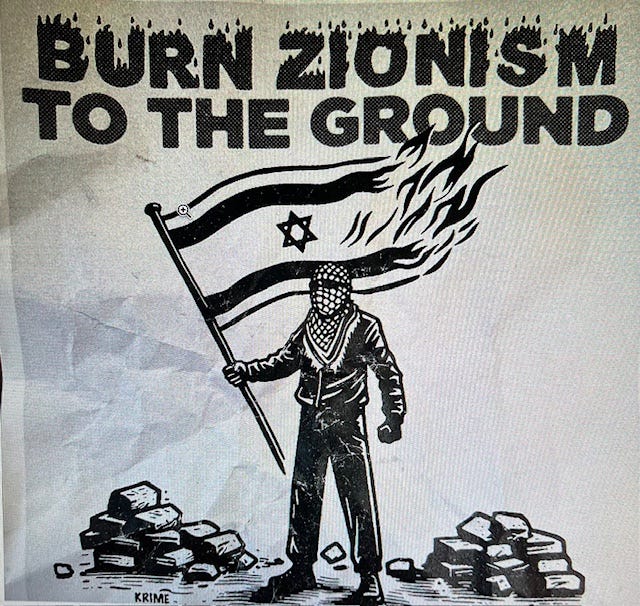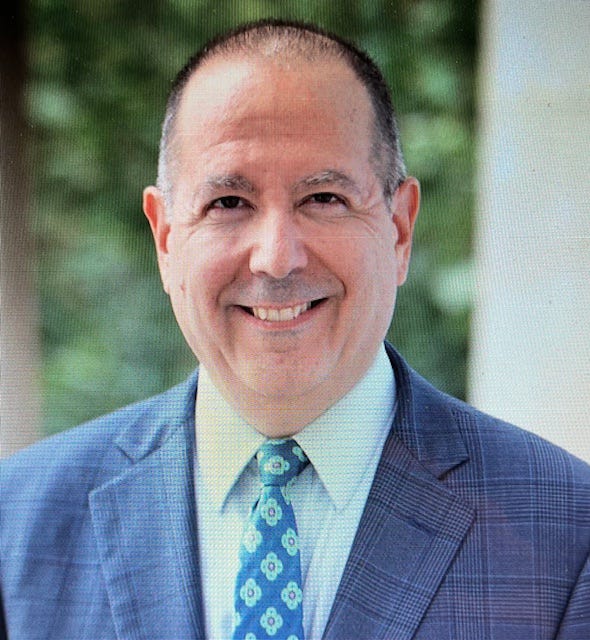Taking Columbia U’s Temperature: Smaller Fire, More Heat
A co-chair of the school’s task force on anti-Semitism spoke candidly this week about progress and challenges.
Free speech? One of the flyers foisted on students in a Columbia classroom last week.
Anti-Israel protests are less frequent at Columbia University this semester, but “the rhetoric is more extreme,” according to David Schizer, a professor at Columbia Law School and one of three co-chairs of the university’s task force on anti-Semitism, created to increase safety, well-being and respect for all.
At a well-attended program Saturday evening on “Rising Anti-Semitism on Campus: The Columbia University Response,” sponsored by the Riverdale Y Jewish Community Partnership, Schizer offered examples of the “good and bad” news about campus life for Jewish students these days. He also reflected on the wide range of factors, including faculty activism and the aftermath of pandemic isolation, that contribute to the often toxic level of student interaction.
Schizer, former dean of Columbia Law School, cited a widely-reported disruption that took place on campus last week. The first day of a course on the history of modern Israel, four students, masked in keffiyehs, entered the classroom and began handing out flyers displaying what the administration described as “violent imagery” – a large boot stamping on a Star of David, and a burning Israeli flag with the words: “Burn Zionism to the ground.”
The positive news, a sign of more robust responses to such incidents, was that the university condemned the incident quickly and strongly, and suspended the one student it was able to identify, noting that its investigation remains active.
The disrupters violated one of the three principles that the task force Schizer co-chairs has adopted, he said. Those principles are anti-discrimination, free speech and the responsibilities of free speech. He explained: “That means my right to free speech is no greater than another’s right,” and in this case the disruptive students were violating the right of the students in the class and the professor. Schizer said he feels “most strongly” that no one in a university is permitted to interrupt a student's right to education.
The professor, Israeli scholar Dr. Avi Shilon, reacted calmly to the interruption and invited the anti-Israel “guests” to stay for the class. They ignored him and left the room. (Videos of the incident, taken by students in the class, can be seen HERE)
(This past summer the 14-member task force interviewed or heard from more than 500 Columbia students and issued a report calling for strengthened or new programs and procedures to enhance safety and respect on campus. Read it HERE.)
‘Classrooms are sacred spaces,’ says Columbia Law School’s David Schizer, who has been teaching for 27 years.
During the Saturday night program, hosted by CSAIR (Conservative Synagogue Adath Israel of Riverdale) and thoughtfully moderated by Ariela Migdal, a CSAIR member and attorney who clerked for Supreme Court Justice Stephen Breyer, Schizer spoke of the complexities – some legal, some political and some based on interpersonal relationships – that universities face in dealing with issues of discrimination, bias and anti-Semitism. His overall impression is that universities, including Columbia, are more focused and serious about protecting Jewish students after last spring’s multiple fiascos. Part of the problem, he has noted, was that the protests last spring were aimed at fellow students, not professors or administrators – a highly charged and uniquely challenging situation.
Anti-Israel slogans are open to interpretation, Schizer noted, with some experts saying the phrase “Intifada now!” is protected by the First Amendment because it doesn’t necessarily impose an immediate threat. He disagrees, asserting that such calls for violence on Columbia’s campus are not protected as free speech.
‘Remarkable Discourtesy’
Reflecting back on last April, when the Columbia situation was “very bad,” Schizer said one aspect that troubled him the most was when “a number of friend groups and study groups dissolved” over a participant’s Jewish identity. He recalled a student coming to him in tears, relating how she was banned from the Hip Hop dance group she was part of for seven semesters, and was told: “no Zionists allowed.”
“I really reject the notion that people can’t disagree on issues within a group,” he said. “We need to develop ways of staying together.”
He attributed at least part of the problem of hostility among students to the Covid pandemic, when as high school students they were isolated socially, taking classes online at home. “This is my 27th year of teaching and I’ve never seen such lack of empathy and remarkable discourtesy” among college students as now. He said his colleagues at Columbia and other universities are “horrified” by this form of angry interaction.
Schizer believes that classrooms are “sacred spaces” where students come to learn and discover what they think rather than be told what to think by a professor. A relatively small number of faculty members see part of their job as political activism, he observed, often taking positions in the classroom on Mideast politics – not the subject they are teaching. “I’m troubled by that behavior,” he said, calling it “bad education,” and at times violation of university rules.
Perhaps the most serious problem for many universities in dealing with anti-Semitism, Schizer said, is not about issuing policies but carrying them out. “We should be more effective in enforcing our rules,” he said. “It’s better now … but many universities are uncomfortable” applying policies that include Jewish and Israeli students to the norms that apply to other minorities. And often the problem is simple “incompetence.” The key, he emphasized, “is to follow the law.”
Asked by audience members whether their children and grandchildren should avoid Ivy League and other universities long seen as the epitome of American educational institutions, Schizer said that each case is individual, and that families should “find the right school for your child.” He acknowledged he is deeply concerned that as a result of the high-profile cases of anti-Semitism on campuses since October 7, 2023, a number of top-level universities are being passed over by concerned Jewish families. “I think it’s terrible for Columbia and, from my perspective, really a shame” for the community.
In a follow-up conversation a few days later, Schizer expanded on his views, pointing out the long-term benefits for Jewish students, the Jewish community and American society when Jewish young men and women attend top schools like Columbia. “Guaranteeing the physical safety for every student is not negotiable,” he said, “and I believe schools can do that.” He asserted that students are more likely to encounter offensive ideas than offensive behavior in class and on campus, and said associating with and making friends with a wide range of fellow students is “positive preparation for a lifetime.”
“I see – and advise – a lot of courage” among Jewish students who hold firm to their convictions, he said.
No doubt, more such courage will be needed for some time.




I am curious about whether you asked David Schizer about Katherine Franke and her departure from Columbia Law School (which I am happy about).
And whether you discussed the fact that "Professor" Joseph Massad is teaching a course on Zionism this semester even though Massad has advocated for Israel’s destruction, praised terrorism against Israeli Jews, blamed Jews for antisemitism, denied the Jewish people’s connection to the Land of Israel, and praised the terrorist group Hamas’s massacre in Israel on October 7, 2023 as "awesome" and "astounding."
It’s just heartbreaking to watch what these young people and Jewish professors are enduring. This would not have been tolerated when I went to Yale in 1996